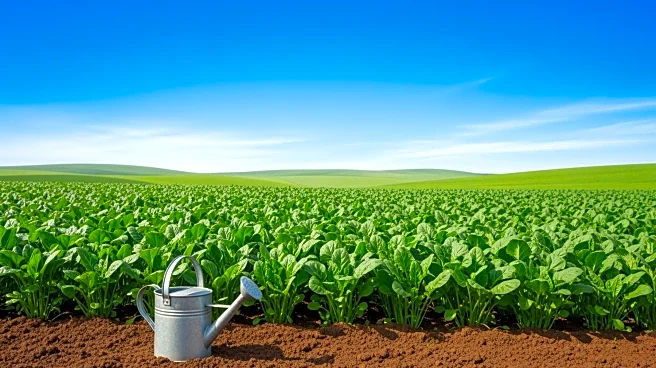What's Happening?
The Global Agriculture and Food Security Program (GAFSP) has announced a $14 million capital allocation to the African Development Bank (AfDB) as part of a new financing initiative aimed at supporting
smallholder farmers across Africa. This investment is the first step in a larger $200 million private-sector financing effort designed to enhance food security and resilience against climate change. The initiative, known as the Business Investment Financing Track (BIFT), combines GAFSP grants with concessional finance and multilateral development bank investments. The initial funding will establish the Agro Inputs Risk Sharing Facility (ARSF), which aims to provide smallholders with access to agricultural inputs and technical assistance. The ARSF includes a $10 million tranche of de-risking capital and $4 million in grant funding for technical assistance, targeting smallholder farmers in Ethiopia, Uganda, Tanzania, Malawi, and Zambia.
Why It's Important?
This initiative is significant as it addresses the critical issue of financing for smallholder farmers, who often face challenges in accessing credit due to perceived high risks. By providing portfolio guarantees to local banks, the ARSF encourages lending to agro-input businesses and cooperatives, thereby strengthening the agricultural value chain. The facility is expected to benefit over 1.5 million smallholder farmers and 500 intermediary agro-dealers and cooperatives, expanding access to essential agricultural tools and resources. This effort aligns with Africa's broader goals of ending hunger, reducing poverty, and enhancing resilience to environmental pressures, as outlined in the Comprehensive Africa Agriculture Development Programme (CAADP) and the Kampala Declaration on Accelerating the Implementation of Africa's Food Systems Transformation.
What's Next?
Future phases of the initiative are expected to expand into other low-income countries, further unlocking investment to strengthen food security across the Global South. The success of this initial allocation could pave the way for scaling up de-risking models that combine public and private resources, potentially transforming the agricultural landscape in Africa and beyond. Stakeholders, including African governments and international development organizations, will likely monitor the outcomes closely to assess the model's effectiveness and scalability.
Beyond the Headlines
The initiative highlights the importance of innovative financing models in addressing global food security challenges. By blending public and private resources, the program not only mitigates risks but also leverages additional investment, demonstrating a sustainable approach to development finance. This model could serve as a blueprint for similar efforts in other regions facing food security challenges, emphasizing the role of collaborative funding in achieving long-term agricultural resilience.









